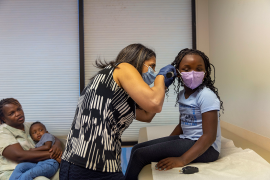In testimony today before the Senate Finance Committee, Commonwealth Fund President Karen Davis presented a compelling case for expanding existing public health insurance programs to provide coverage for the most vulnerable segments of the nation's 42.6 million uninsured. She stressed the importance of expanding Medicaid and the Children's Health Insurance Program (CHIP) to cover parents of covered children. Medicare and Medicaid cover one of four Americans, and have 35 years' experience providing health insurance to the sickest and poorest among us. The programs are ideally suited to covering the uninsured with low incomes, unstable jobs, and serious health problems, Davis noted. While funded by the government, Medicare and Medicaid use private insurers when it is efficient to do so. Both programs purchase services from private managed care plans and make extensive use of private insurers as administrative claims payment agents. Davis was cautious about the use of tax credits to expand coverage. "The provision of tax credits for the purchase of nongroup insurance is particularly problematic," she said. "A $1,000 tax credit toward an $8,000 premium for a 60-year-old woman earning less than $35,000 a year is hardly sufficient to make such coverage affordable. It is difficult to adjust tax credits to take account of variations in individual health insurance premiums by age, geographic location, and health status." Different strategies should be employed to cover different groups, Davis said. Some options for expanding existing programs include:
- Covering uninsured patients under Medicaid/CHIP (2.2 million with incomes less than 200% of the federal poverty level newly covered)
- Expanding Medicaid to uninsured family members of disabled special needs children and disabled adults on Medicaid (more)
- Providing premium assistance under Medicare to cover uninsured adults age 55 and over (3.4 million)
- Covering uninsured dependents of elderly Medicare beneficiaries (600,000 people) and uninsured family members of disabled Medicare beneficiaries
- Expanding Medicare coverage of the sick and disabled (3.7 million uninsured under age 55) by eliminating the two-year waiting period and broadening eligibility to those able to work
- Improving the link between public programs and employer coverage through premium assistance and other methods (5 million to 13 million uninsured)
- Increasing low-wage worker participation in employer health plans through employer-administered premium assistance (6 million uninsured workers and family members not currently participating in employer plans)


